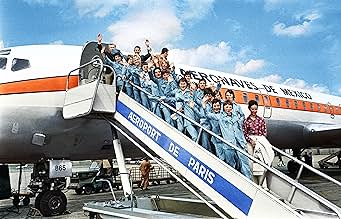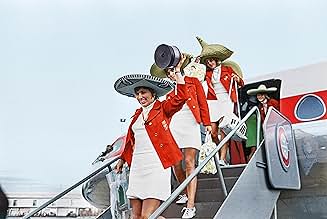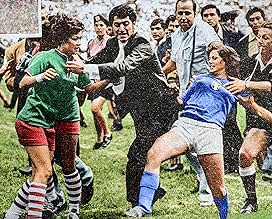Told by the pioneering women who participated, this is the extraordinary story of the 1971 Women's Soccer World Cup, a tournament witnessed by record crowds that has been written out of spor... Read allTold by the pioneering women who participated, this is the extraordinary story of the 1971 Women's Soccer World Cup, a tournament witnessed by record crowds that has been written out of sporting history - until now.Told by the pioneering women who participated, this is the extraordinary story of the 1971 Women's Soccer World Cup, a tournament witnessed by record crowds that has been written out of sporting history - until now.
- Directors
- Writers
- Stars
- Awards
- 2 wins & 10 nominations total
- Directors
- Writers
- All cast & crew
- Production, box office & more at IMDbPro
Featured reviews
This is a great documentary and a must-watch for everyone. I knew about Copa 71 before I watched the movie, but I din't know much of the details. I was crying my eyes out, out of anger and frustration.
At one point, when they interview some of the Argentinian women and they mention how little support they got from their federation, I imediately thought about last weeks news that the now active Argentinian womens team only got a banan and a sandwich for lunch at their last assembly. While progress in womens football has exploded in the last few years it is vital that we all help making sure that every country support the womens team as much as the mens team.
Anyway. Watch this movie and weep. Then rise up and organize.
At one point, when they interview some of the Argentinian women and they mention how little support they got from their federation, I imediately thought about last weeks news that the now active Argentinian womens team only got a banan and a sandwich for lunch at their last assembly. While progress in womens football has exploded in the last few years it is vital that we all help making sure that every country support the womens team as much as the mens team.
Anyway. Watch this movie and weep. Then rise up and organize.
It's quite interesting that even now, there are those amongst the footballing establishment who dismiss this competition as little better than an unsanctioned exhibition event of no consequence whatsoever. If you watch it, however, you can't help but get a sense of the pride with which the women from six teams assembled in Mexico to play. James Erskine et al has done a quite an effective job tracking down many of the players who took part and at finding some grainy, but perfectly watchable, archive of the games and of the celebratory nature of the hosting country back in 1971. The narrative and commentaries take a pretty firm swipe at the men-only culture that prevailed in the sport - and amongst most of their advising medical professionals - which limited women's participation in the sport and though the film make precisely no attempt to balance it's clear objective with any counter-arguments about the perceived dangers to women players, or feature any interviews with anyone from FIFA or UEFA regarding their decision making rationale, this still makes for quite a powerful depiction of just how inclusive football, as a sport, can be. The contributors are engaging and as one Dane points out - she can knit and she can use a chainsaw, so why not play football?
If this documentary is not nominated to an Oscar or an Emmy, it is a crime.
The subject is quite niche but the undertones of a social statement are there. It's denouncing one of the greatest injustices in sports history. To think this was hidden for so many years just because it was a woman's event it's almost unbelievable.
The first hands stories of these pioneers are grappling and inspiring.
The perspective of those who comment through experience and how they got to the 71 event makes this probably the best sports documentary ever made.
If you believe in social causes, football, or just plain storytelling, this is it.
The subject is quite niche but the undertones of a social statement are there. It's denouncing one of the greatest injustices in sports history. To think this was hidden for so many years just because it was a woman's event it's almost unbelievable.
The first hands stories of these pioneers are grappling and inspiring.
The perspective of those who comment through experience and how they got to the 71 event makes this probably the best sports documentary ever made.
If you believe in social causes, football, or just plain storytelling, this is it.
"Copa 71" premiered at TIFF last month, and made its US debut at DocFest as part of the Seattle Independent Film Festival. It received rave reviews at both, so it's telling that as of this writing it's currently rocking a 4.5/10 on IMDb for what is probably the most egregious sin of all-- treating women like human beings.
The film has one primary focus, as shown in the title: In 1971, in Mexico City and Guadalajara, a non-FIFA Women's World Cup was held. Six teams were invited, and where the tournament holders imagined it a sideshow, they had dollar signs in their eyes and stadiums to fill (FIFA denied them the use of the regular stadiums, so they were 'forced' into the two largest stadiums in the country).
As a film, its focus is narrow, but that singular focus is so utterly fascinating, and the players so passionate, that this is hardly a complaint. The burial of this sporting event is mentioned barely at all, the film doesn't even make mention of the next (also overlooked) women's tournament in 1985, skipping to the first official FIFA sanctioned event in 1991.
These are minor concerns, as the film is necessary both as an educational tool, and as a historical document. I'm male, I've got a basic familiarity with soccer, but like all great sports documentaries, you can go in blind and be captivated by the story they're trying to tell, regardless. Yes, the open sexism these women had to deal with is still alive and well (see: the current IMDb rating), but that is less the focus than the very real fact that even in 1971, women playing soccer sold out a 110,000 seat stadium.
You can't not love these women, unless you're the unfortunate type of person who never cared for women in the first place. If that's you, you don't need to review bomb, just find something else to be mad about. Women's soccer is the fastest growing sport in the world, and this documentary is a testament that it's been a long time coming.
The film has one primary focus, as shown in the title: In 1971, in Mexico City and Guadalajara, a non-FIFA Women's World Cup was held. Six teams were invited, and where the tournament holders imagined it a sideshow, they had dollar signs in their eyes and stadiums to fill (FIFA denied them the use of the regular stadiums, so they were 'forced' into the two largest stadiums in the country).
As a film, its focus is narrow, but that singular focus is so utterly fascinating, and the players so passionate, that this is hardly a complaint. The burial of this sporting event is mentioned barely at all, the film doesn't even make mention of the next (also overlooked) women's tournament in 1985, skipping to the first official FIFA sanctioned event in 1991.
These are minor concerns, as the film is necessary both as an educational tool, and as a historical document. I'm male, I've got a basic familiarity with soccer, but like all great sports documentaries, you can go in blind and be captivated by the story they're trying to tell, regardless. Yes, the open sexism these women had to deal with is still alive and well (see: the current IMDb rating), but that is less the focus than the very real fact that even in 1971, women playing soccer sold out a 110,000 seat stadium.
You can't not love these women, unless you're the unfortunate type of person who never cared for women in the first place. If that's you, you don't need to review bomb, just find something else to be mad about. Women's soccer is the fastest growing sport in the world, and this documentary is a testament that it's been a long time coming.
This is a documentary film of the 1971 Women's World Cup in Mexico. This opens with an interview with Brandi Chastain. The interviewer shows her footage from a 1971 game and she is shocked. She had never seen nor known of such an event.
This is amazing true history that apparently nobody but only those who witnessed it would remember. This does a great job documenting it with the ladies. I would like more from the men who created it and ran it. There is more story from that angle especially after the event. I want to know who and how this event was essentially erased. There needs to be more revelation than The Men. I would also like to know where that trophy is now.
This is amazing true history that apparently nobody but only those who witnessed it would remember. This does a great job documenting it with the ladies. I would like more from the men who created it and ran it. There is more story from that angle especially after the event. I want to know who and how this event was essentially erased. There needs to be more revelation than The Men. I would also like to know where that trophy is now.
Did you know
- TriviaCarol Wilson, who played was the England captain in the tournament, was only 19 years old at the time. Three of her teammates, Leah Caleb (age 13), Gill Sayell (14) and Chris Lockwood (15) were still schoolgirls when they played in the tournament.
- How long is Copa 71?Powered by Alexa
Details
- Release date
- Country of origin
- Official sites
- Languages
- Also known as
- Copa '71 - succén som tystades ner
- Production companies
- See more company credits at IMDbPro
Box office
- Gross worldwide
- $197,067
- Runtime
- 1h 30m(90 min)
- Color
- Aspect ratio
- 2.00 : 1
Contribute to this page
Suggest an edit or add missing content
























